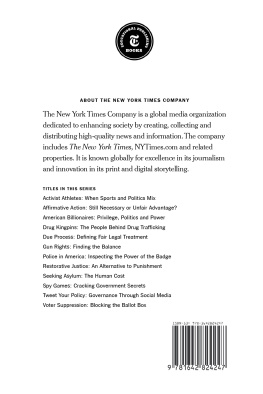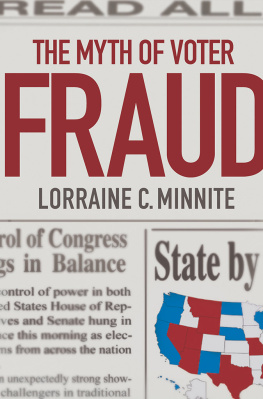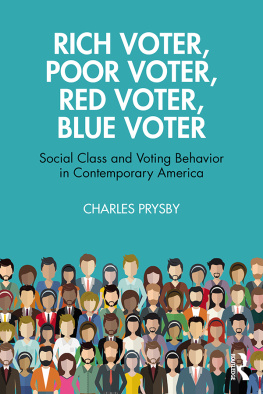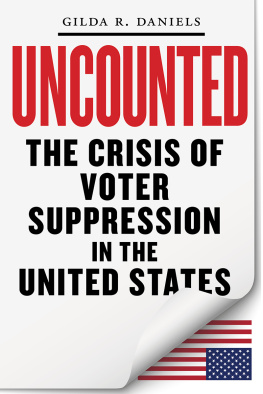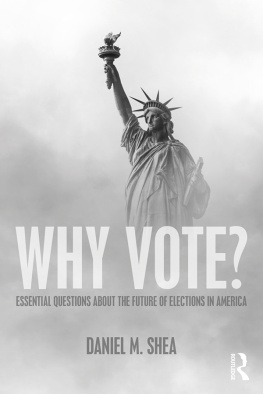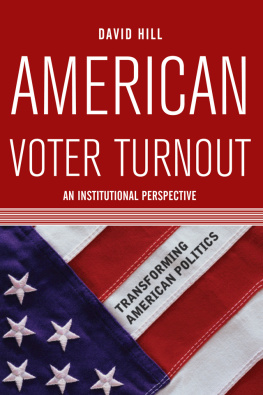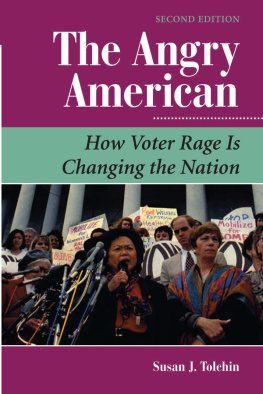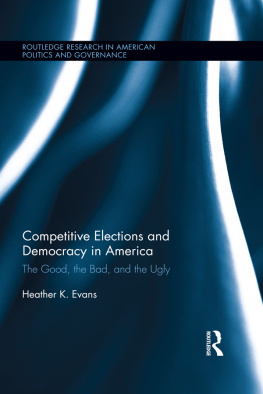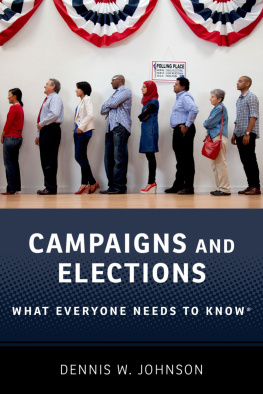COMPETITIVE ELECTIONS AND THE AMERICAN VOTER
AMERICAN GOVERNANCE:
POLITICS, POLICY, AND PUBLIC LAW
Series Editors:
Richard Valelly, Pamela Brandwein,
Marie Gottschalk, Christopher Howard
A complete list of books in the series is available from the publisher.
Copyright 2011 University of Pennsylvania Press All rights reserved. Except for brief quotations used for purposes of review or scholarly citation, none of this book may be reproduced in any form by any means without written permission from the publisher.
Published by
University of Pennsylvania Press
Philadelphia, Pennsylvania 19104-4112
www.upenn.edu/pennpress
Printed in the United States of America on acid-free paper
10 9 8 7 6 5 4 3 2 1
Library of Congress Cataloging-in-Publication Data
ISBN 978-0-8122-4334-5
For Grigo
CHAPTER 1
Introduction
Americans love to hate political campaigns. Voters find them tiresome, politicians find them draining, and scholars find them shallow. As a consequence, the list of campaign reform proposals grows longer with each election cycle. For example, the Alliance for Better Campaigns wants broadcasters to provide free air time to candidates for political advertisements and debates while the Institute for Global Ethics wants candidates to sign codes of conduct in which they promise to adhere to ethical campaign practices. In addition, a handful of organizations have cropped up recently, largely due to the largesse of the Pew Charitable Trusts, to train candidates and young people who want to become political consultants how to run fair and ethical campaigns. Finally, a group of scholars have developed a set of reforms to increase public deliberation during elections, including a deliberative poll (Fishkin 1995) and a national Day of Deliberation (Ackerman and Fishkin 2004). In short, a vast amount of money and effort has been expended in recent years to figure out ways of providing voters with better campaign information.
Although the intentions of these groups are laudable, recent research suggests that these efforts have had little effect on campaigns. For example, scholars have discovered that ad watches on news programs, which are designed to critique campaign advertisements and reveal what is misleading or deceptive about them, have the perverse effect of reinforcing the advertisements content rather than countering it (McKinnon and Kaid 1999). In addition, a recent study of reforms designed to improve campaign discourse, such as voluntary codes of conduct and pledges to avoid negativity, describe their results as disappointing (Maisel et al. 2007, 2). Few candidates and consultants are willing to sign such pledges, and if in the off chance they do, they are more than willing to break them when the need arises. Thus, the main problem with the current campaign reform movement appears to be that a great deal of energy and resources is being wasted on reforms that do nothing to improve campaigns for voters.
This situation suggests that the United States campaign reform movement is in need of a major course correction and the goal of this book is to help it identify a new path. It argues that if reformers are truly seeking to improve campaigns for voters, their best course of action is to pursue reforms that will make elections more competitive. This conclusion is likely to make many uncomfortable because competitive elections are often associated with more negative campaigns, and it is not a stretch to say that negativity is the arch-nemesis of todays campaign reform movement. Many view campaign negativity not only as an irritation but as a scourge that afflicts the body politic each election cycle and must be eradicated. Yet, this book argues that negativity is a hobgoblin that prevents reformers from seeing the benefits of competitive elections. The fact is such contests generate information environments with characteristics that are highly desirable from the perspective of democratic theory. In other words, competitive elections expose voters not only to more information, but to better information.
To be fair, this study will argue that too much competitiveness, what one might refer to as hypercompetitiveness, can generate campaign information environments that are less helpful for voters because they find it difficult to process the deluge of information inundating them (as is sometimes the case in Senate and presidential elections). In Chapter 6, the analysis also shows that some hypercompetitive campaigns, such as those conducted by presidential candidates in battleground states, can lead to feelings of ambivalence, that is, having both positive and negative feelings about the candidates, which depress voter willingness to participate despite the campaigns relentless mobilization efforts. Such hypercompetitive elections are becoming rarer and rarer in American politics, however, especially in congressional elections, and the discovery that they may not be as helpful for voters should not blind us to the fact that uncompetitive elections enervate and demobilize the electorate.
The close nature of recent presidential elections might lead one to believe that electoral competition is alive and well in this country but the vanishing marginals in congressional and statewide races tell a different story (Mayhew 1974). Many political observers recognize that as the marginals vanish, so too does the ability to hold representatives accountable, but they may not fully appreciate that the information, which is necessary in a democracy if voters are to make informed decisions about their representatives, disappears as
Democracy and Political Campaigns
To understand why competitive elections are so beneficial for voters, one must first understand what kinds of information voters need from the standpoint of democratic theory. Gaining this vantage point, however, is difficult for two reasons. The first is suggested by Robert Dahl, There is no democratic theorythere are only democratic theories (Dahl 1956, 1). In other words, democratic theory comes in many shapes and sizes and there is by no means a consensus about which form is preferable. Consequently, my analysis in Chapter 2 draws on three schools of democratic thought, including competitive, egalitarian and deliberative accounts of how democracy should function. If one were to attach the names of particular theorists to these schools, they might include Joseph Schumpeter, Robert Dahl, and James Fishkin, respectively.
Second, democratic theorists have historically paid little attention to campaigning, preferring to dwell more on governance rather than on the means by which candidates are elected to office. This lack of interest stems in part from the fact that the arena of governing offers enough food for thought, but also from the belief that campaigns are just plain unruly and wild. Alexis de Tocqueville provides an example of this attitude toward campaigns when he describes the nineteenth-century electioneering he observed while traveling in the United States: At this time factions redouble their ardor; then every forced passion that imagination can create in a happy and peaceful country spreads excitement in broad daylight.... The whole nation gets into a feverish state (1969, 135).







